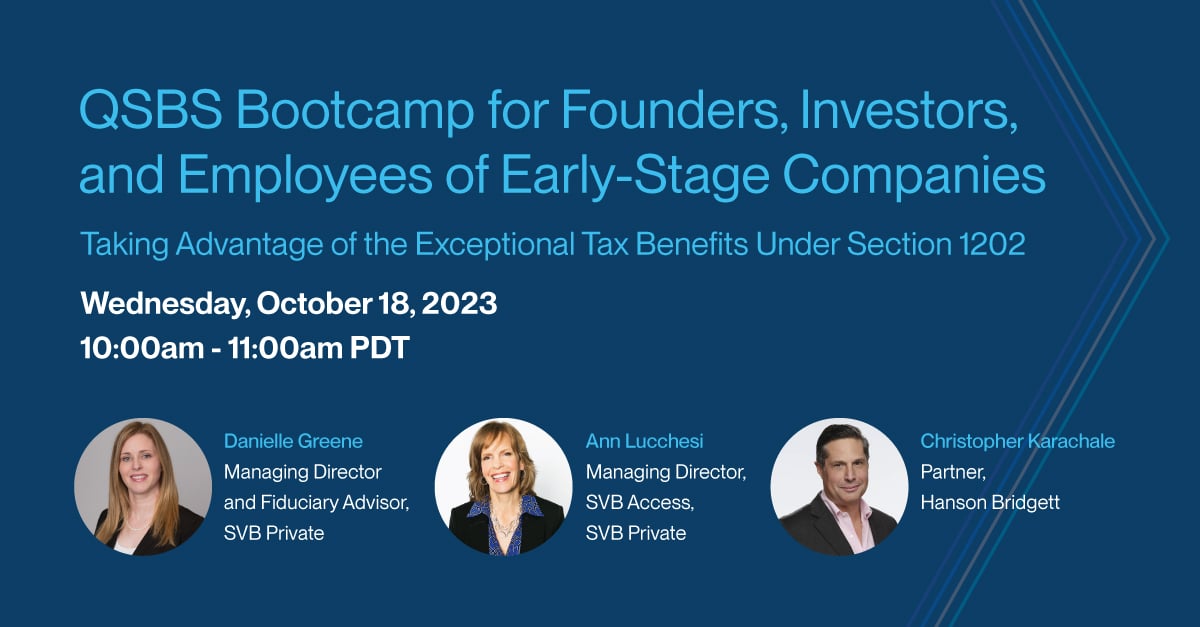We’re pleased to provide you with insights like these from Boston Private. Boston Private is now an SVB company. Together we’re well positioned to offer you the service, understanding, guidance and solutions to help you discover opportunities and build wealth – now and in the future.
Several taxpayer favorable surprises in the final pass-through regulations
A part of the Washington policy series
The 2019 tax filing season is upon us and this is the second year of the 2017 Tax Cuts and Jobs Act. On January 18, 2019, the IRS published final regulations on application of the pass-through tax break for business owners. The regulations provide clarity on what type of businesses and investments qualify for the pass-through tax break. The tax breaks are generous, and if your tax situation has changed, a quick review of the provisions may save you taxes.
The final regulations are generally taxpayer favorable. Highlights include:
- A new safe harbor for real estate rental businesses that qualify for the pass-through deduction. Triple net lease activities do not qualify for the safe harbor.
- A rental activity is treated as a trade or business qualifying for the pass-through deduction if it is rented to a commonly controlled trade or business owned by the taxpayer, called a self-rental.
- Extension of the pass through tax deduction to dividends received by investors who own real estate investment trusts (REITS) through mutual funds.
- Insurance and real estate brokers and traditional banking generally qualify for the pass-through tax deduction.
For background, in 2017, the Republican-led Congress passed the first major tax overhaul bill since the Tax Reform Act of 1986. The new tax law provides a significant tax break for certain types of domestic pass through entities like partnerships, S corporations, limited liability companies, trusts, estates, and sole proprietorships. The pass-through tax break (also known by its Internal Revenue Code Section 199A) is the most complicated provision of the 2017 tax cut law because of its broad application to many different kinds of businesses and its convoluted structure. Small business owners especially in the real estate, consulting, securities and banking industries are clamoring for clarity on whether their business qualifies for the tax break and how to calculate it as they enter the 2018 tax filing season.
Changes for business owners
Under the law, qualifying businesses can reduce their taxable business income by as much as 20% under the pass-through tax deduction. The pass-through tax deduction is not available to C corporations. The pass through deduction is effective for tax years 2018-2015. For those of you who have been following our postings on this topic you will appreciate the complexity of this provision in terms of what businesses qualify and how to calculate the deduction. The following summarizes the pass-through deduction:
First, pass through business owners in a service or reputation-based business, such as doctors, lawyers, consultants, and financial planners, with taxable income in excess of $210,700 or $421,400 in 2019 in the case of taxpayers married filing jointly, do not qualify for the pass-through deduction with the exception of small service and reputation-based businesses with taxable income below the above noted levels.
Second, for all other pass through qualifying businesses, the pass-through tax deduction against qualifying income is limited to the greater of:
- 50% of the taxpayer's share of the W-2 wages paid with respect to the qualified trade or business a, wage test, or
- The sum of 25% of the taxpayer's share of the W-2 wages with respect to the qualified trade or business, plus
- 2.5% of the taxpayer's share of the unadjusted basis immediately after acquisition of all qualified property (property test)
Third, the pass-through tax deduction generated from the above formula cannot exceed 20% of the excess of:
- The taxpayer's taxable income for the year, before considering the pass-through deduction, over
- The sum of net capital gains of the taxpayer for the year.
The above limitations ensures a pass-through business that reports a net loss in its qualifying business is not eligible for the pass-through deduction and that capital gains which are taxed at preferential rates do not receive the additional benefit of the pass-through deduction.
It is worth mentioning again, all pass through businesses including those in a service and reputation-based businesses with taxable income below $210,700 or $421,400 (in the case of taxpayers married filing jointly) qualify for the full 20% pass through tax deduction on business income.
Fourth, all taxpayers regardless of industry and income qualify for a 20% deduction of their qualified REIT dividends and publicly traded partnership (PTP) income for the year. This provision is a clear nod to the real estate industry by Congress.
The wage and property limits in the formula for larger pass-through businesses were added by Congress to increase the pass-through deduction for non-service businesses that are wage heavy such as, manufacturing, and businesses that are investment heavy, real estate, for example.
Impact on real estate investors
To qualify for the pass-through deduction, a pass-through entity must be in a trade or business. The proposed regulations issued in 2018 left uncertainty regarding what level of real estate activity rises to the level of a trade or business. Owing to this uncertainty, public comments on the proposed regulations shared a common theme: each begged for clarity on how to determine whether rental activity rises to the level of a trade or business. Whether an activity rises to the level of a trade or business, continues to be largely a factual question under the final regulations. The Treasury Department and the IRS have concluded that the factual setting of various trades or businesses varies so widely that a single rule or list of factors would be difficult to provide in a timely and manageable manner and would be difficult for taxpayers to apply.
However, the regulations mention these factors are relevant in determining whether real estate actives are considered a trade or business. The factors:
- the type of rented property (commercial real property versus residential property),
- the number of properties rented,
- the owner’s or the owner’s agents day-to-day involvement,
- the types and significance of any ancillary services provided under the lease, and
- the terms of the lease (for example, a net lease versus a traditional lease and a short-term lease versus a long-term lease).
The Treasury Department and IRS recognize the difficulties taxpayers and practitioners may have in determining whether a taxpayer’s rental real estate activity is sufficiently regular, continuous, and considerable for the activity to constitute a qualifying trade or business. To help taxpayers, the final regulations provide a useful safe harbor for real estate rentals.
Safe harbor for real estate rentals. The regulations provide additional clarity regarding real estate rentals. In Revenue Procedure 2019-7, the IRS offers a safe harbor providing that a rental activity (or multiple rentals if the taxpayer chooses to treat them as a combined enterprise, with the understanding that commercial properties cannot be grouped with residential properties) will rise to the level of a trade or business if:
- Separate books and records are maintained for each rental activity, or the combined enterprise if grouped together
- 250 hours or more of rental services are performed per year for the activity (or combined enterprise), and
- The taxpayer maintains contemporaneous records, including time reports or similar documents, regarding 1) hours of all services performed, 2) description of all services performed, 3) dates on which such services are performed, and 4) who performed the services.
For these purposes, rental services include advertising, rent, negotiating and executing leases, verifying tenant applications, collection of rent, daily operation and maintenance, management of the real estate, purchase of materials, and supervision of employees and independent contractors.
Hours spent by any person with respect to the owner’s capacity as an investor, such as arranging financing, procuring property, reviewing financial statements or reports on operations, planning, managing, or constructing long-term capital improvements, and traveling to and from the real estate are not considered to be hours of service with respect to the enterprise.
This safe harbor is helpful news for many taxpayers. But there are some activities that get shut out of the tax break. A taxpayer can't use the safe harbor for the rental of any residence that the taxpayer uses as a personal residence for more than 14 days during the year. For example, if you rent your vacation house for three weeks a year but live in it for four weeks, the safe harbor is unavailable to you.
The final regulations provide one exception to the trade or business requirement for rentals. A rental activity is treated as a trade or business if it is rented to a "commonly controlled" trade or business owned by the taxpayer. Thus, a self-rental is granted de facto trade or business status, even if the activity might not have otherwise satisfied that standard. To be commonly controlled, the property must be rented to an individual or pass-through business and the same owner or group of owners must own 50% or more of both the property and business. This makes sense because many businesses own their physical locations separate from their operating businesses and lease the property to the operating businesses.
In an unfortunate turn in the regulations, a taxpayer cannot use the safe harbor for any property rented on a triple net lease basis. Generally, the landlord passes on the responsibility for paying real estate taxes, insurance, and maintenance to the tenant in a triple net lease. This is an unfortunate result because one could see that managing several properties on a triple net lease basis would be an active trade or business. The safe harbor is not available to claim trade or business status, but the business owner can still argue the activity rises to the level of an active real estate business and should qualify for the pass-through tax deduction.
For service and reputation-based businesses
Congress concluded that service and reputation-based businesses (with the exception of architecture, engineering, and smaller businesses in any industry) should not qualify for the pass-through deduction. They reason the income from these businesses is more akin to wages which should be taxed at the highest marginal tax rate. The law defines service and reputation-based businesses as including the performance of services in the fields of health, law, engineering, architecture, accounting, actuarial science, performing arts, consulting, athletics, financial services, brokerage services, or any trade or business where the principal asset of such trade or business is the reputation or skill of one or more of its employees As you can imagine taxpayers in larger service and reputation-based businesses are not happy being generally shut out of the pass through deduction. However, the final regulations summarized below provide a ray of hope for some in these industries.
Health
- Doctors, pharmacists, nurses, dentists, veterinarians, physical therapists, psychologists, and other similar healthcare professionals do not qualify for the pass-through deduction. It is important to note, the proposed regulations, broaden the language of prohibited medical businesses to include "other similar healthcare professionals” who provide medical services directly to a patient. The final regulations removed the italicized section, which likely broadens the scope of health businesses that do not qualify for the pass-through deduction. For example, removal of that language means that someone like a radiologist or technician, who may not meet directly with a patient and thus perhaps previously had an argument that they were not in the field of health, will now fit squarely within its definition.
- The final regulations clarify that services that may improve the health of the recipient, such as the operator of a health club or spa, or the research, testing, and sale of pharmaceuticals or medical devices qualify for the pass-through deduction. In addition, the final regulations responded to public comments by providing examples reflecting that with the right facts, an assisted living facility and a surgery center may NOT be in the field of health. Furthermore, The Treasury Department and the IRS agree that the sale of pharmaceuticals and medical devices by a retail pharmacy is not by itself a trade or business in the field of health thus these businesses will likely qualify as a pass-through business.
Law
- It is clear that traditional legal services do not qualify for the pass-through deduction if the business owners earn above income thresholds discussed earlier in the article. However, the regulations provide that services not unique to law, like printing, stenography and delivery services qualify for the pass-through deduction.
Consulting
- The regulations do not provide much help. The general rule is that if you are providing advice and counsel to a business without more, it is likely to be a disqualified business. Furthermore, Consulting services that are separately billed are generally not considered to be provided in the context of the provisions of goods or services and hence do not qualify for the pass-through deduction.
- Sales people and those who provide training or educational courses qualify for the pass-through deduction. The regulations include an example of a qualified business where a business consults on employment and is compensated on placing job applicants.
Financial services and banking
- Businesses that provide financial services to clients including managing wealth, developing retirement or transition plans, and M&A advisory do not qualify for the pass-through deduction. This means financial advisors, investment bankers, wealth planners, and retirement advisors do not qualify for the pass-through deduction. Traditional banking including lending of money and making loans qualify for the pass-through deduction.
Brokerage services
- Consistent with the interim regulations, a traditional securities broker is disqualified. However, real estate and insurance brokers qualify for the pass-through deduction.
Investment management
- Real estate management generally qualifies for the pass-through deduction. The gray area occurs when most activities are limited to managing tripe net leases (discussed above).
- Asset management or investment management services do not qualify.
Other clarifications
- Wages and guaranteed payments paid to an S corporation shareholder. The final regulations make clear amounts paid as W-2 wages and guaranteed payments to an S corporation shareholder cannot be included in the recipient’s business income subject to the pass-through deduction. This makes sense because a shareholder cannot pump up his/her income for the 20 percent pass through deduction using these payments. However, wages paid to employees are included for purposes of calculating the “wage” test in the formula that expands the 20 percent pass through deduction for qualifying businesses.
- When is the value of property counted in calculating the 20 percent pass through deduction? Real estate heavy businesses can increase their pass-through deduction if they have substantial investment in real estate (the property test). Concerned that taxpayers may pump up their pass-through deduction with property purchases at year end, the final regulations generally exclude property is acquired within 60 days of the end of the taxable year and disposed of within 120 days of acquisition without having been used in a trade or business for at least 45 days prior to disposition.
- Aggregation of trades and businesses for calculating the wage and property limits when calculating the pass-through deduction. Continuing the discussion of how to maximize your pass-through deduction, the proposed regulations provide rules that allow a taxpayer to aggregate qualifying trades or businesses based on a 50-percent common ownership test. The rule is satisfied so long as one person or group of persons hold a 50 percent or more ownership interest in each trade or business. In a pro-taxpayer development, the final regulations do not require identical or a minimum ownership threshold for purposes of the aggregating qualifying businesses. The aggregation rules are intended to allow aggregation of what is commonly thought of as a single trade or business where the business is spread across multiple entities.
- Businesses with qualified and non-qualified activities. A business that provides more than 80 percent of its property or services to a disqualified business does not qualify for the pass-through deduction for any part of its rental businesses if there is 50 percent or more common ownership of the businesses according to the proposed regulations. The final regulations remove the 80 percent threshold and allow any portion of the property that is leased to an eligible business to be eligible for the section 199A deduction. For example, if the dentist leases 90 percent of the building to her dental practice and 10 percent to a coffee shop, the 10 percent would now be eligible for the section 199A deduction. This change removed a threshold in the anti-abuse rules to simplify compliance knowing taxpayers would find ways to work around the rule.
As you can see the regulations are complicated. However, as we have said since the law’s passage in 2017, you may be able to qualify for a significant tax break with careful and planning with your tax advisor.














